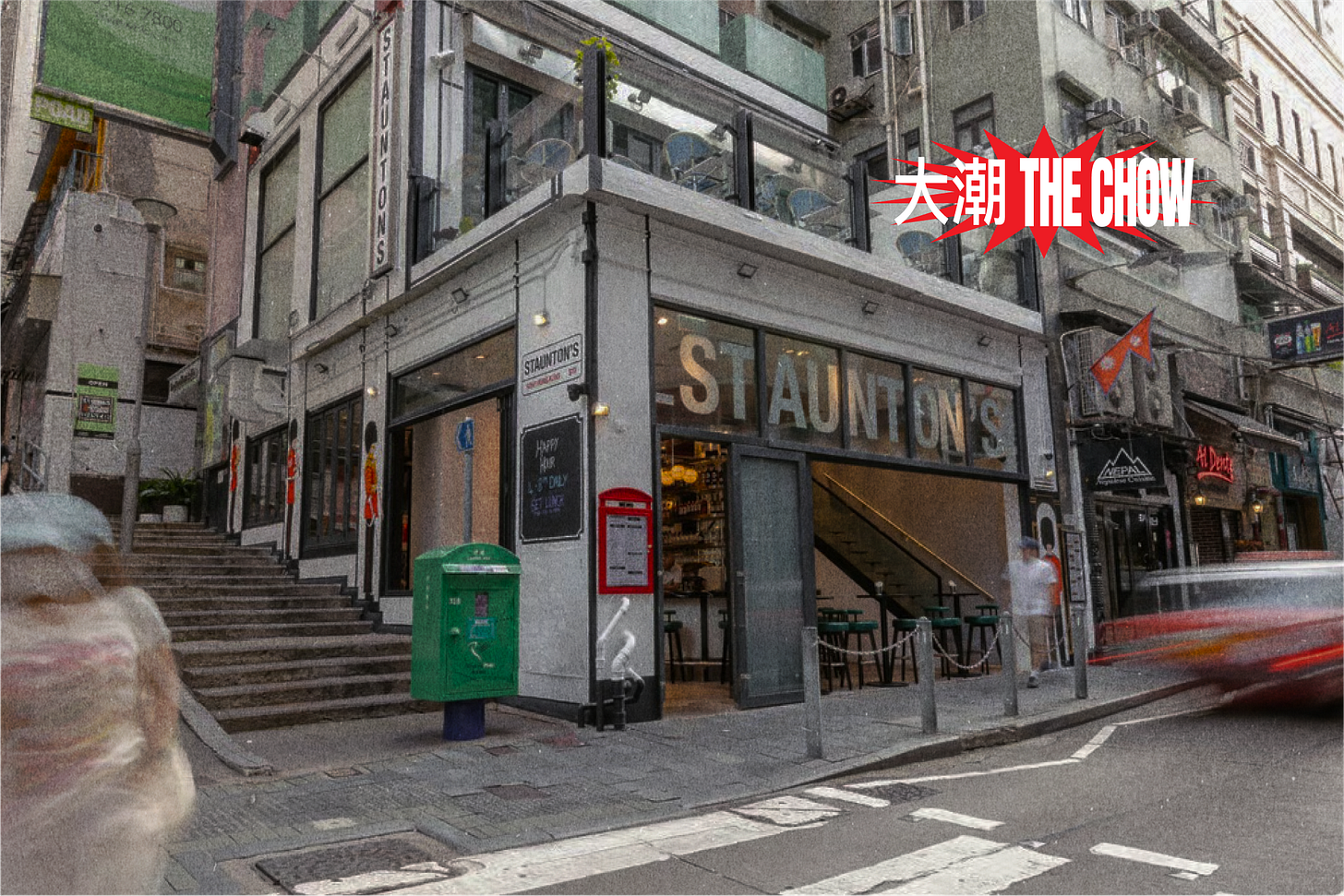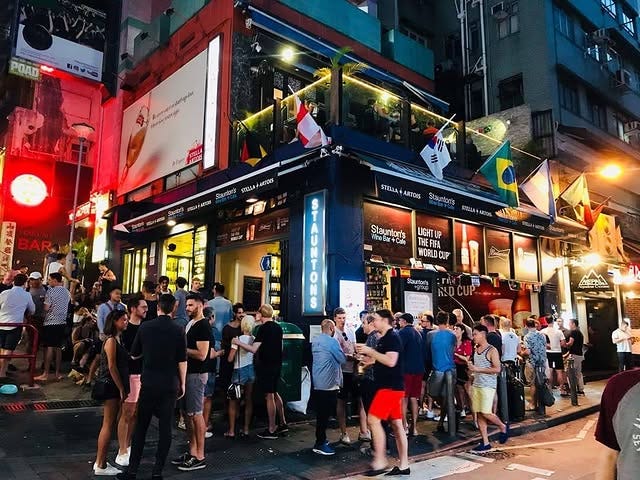“Expat” is a Dying Subculture
At Staunton’s—a longstanding expat hub in Hong Kong—foreigners are trading transience for deeper ties to the city.
A founding myth of the globalization age was the promise that geography no longer determined opportunity. In theory, you could live and work anywhere. You might stay put—working in manufacturing in the American Midwest, teaching in northern England, or running a small business in a vaguely known European country—and life would be simple, predictable. But you could also seize the promises of a distant land: relocate to a regional office in Hong Kong, take a post at an international school in Southeast Asia, or launch a startup in Dubai (plenty of entrepreneurs there, anyway).
That a high-skilled, white collar worker might hop between countries might seem like a trite, mundane fact of life today. But much of the “global” “borderless” economy is often something we take for granted. Only three decades ago, the Cold War had ended, and deregulated free market economies were not yet the de facto for every country in the world. Following the 1990s, the world embraced free trade and free-er borders: the World Trade Organization was founded in 1995, and in the same year, Europe fully implemented its Schengen agreement for free movement of peoples across the continent.
I’ll spare the details. This isn’t a history newsletter and the paradigm shift towards globalization is so hard to capture in a few sentences. But it might be better understood through people. Because with goods exchanging so freely between nations, so did men and women: between 1990 to 2024, the number of people living in a country that was not their own had nearly doubled. And some countries today are primarily populated by the foreign born: the UAE (88%), Qatar (88%), Oman (43%).
This is the world of the expat, a new class of people made possible by globalization. They are high-paid corporate executives in regional offices of multinationals, ESL teachers with rural origins, artists living like travelling bards, or out-of-touch foreign correspondents for the Washington Post. They are scattered across the world, living and working in countries that are not their own. They exist precisely because free trade, foreign direct investment, and international corporate expansions make labor move seamlessly between borders. They are stateless by choice, free from the web of family and cultural baggage to weigh them down, as terrifying or liberating as that may be.
Expats captured the world’s push towards globalization, but a rootless existence is becoming less and less feasible—nativist sentiment is growing and schemes that once welcomed international labor are actively being rolled back. The writing was on the wall already in 2021, when the Financial Times published a column declaring the death of the “expat city state”—the Hong Kongs, Singapores, Dubais of the world where life as an expat is baked deeply into the city’s culture. As Janan Ganesh, the writer, argues, Hong Kong’s reintegration with China, Singapore’s new commitment to a national “core,” and the UAE’s domestic employment has “shooed out legion expats” are diminishing the role of global labor and leaving expat communities in limbo.
What is the future of the expat subculture in the new age of deglobalization?
I live in Hong Kong, an “expat city” that lathers itself in globalization-era platitudes like “East meets West,” “cultural melting pot,” etc., tooting its own horn about its blend of colonial history with modern Chinese characteristics. But despite all of the former British colony’s bark about cultural fusion, one of the city’s biggest expat hubs, looks British to the point of parody.
Here at Staunton’s bar, it’s 4pm on a Tuesday, and expats gather to watch a premier league game on a TV hanging overhead, while sipping fresh-from-the-tap glasses of Guinness. On the wall, the words “Keep Calm and Have a Pint” (an homage to Britain’s WWII-era “Keep Calm and Carry On” campaign) are plastered on a scratchy, bruised print of the Union Jack. On the second floor, signs of London Underground stations hang on the walls, while pillows printed with the British flag line along sofas. The white walls outside are painted with more British flags and a life-sized copy of a King’s Guard sentry.
The image of the expat is often young, white, buttoned up in a white shirt and full of earning potential. But during the 4pm Tuesday Happy Hour, it was obvious that the number of young expats in the city was shrinking: The crowd mostly consisted of pot-bellied caucasians slightly past middle age with their Filipino wives—men who had been here for decades and long settled down.
Staunton’s first opened in 1997, primarily to serve the expats living in the Mid-levels neighborhood above. “[Back then], most of the nearby stores were all selling Chinaware and Crockery. The next street up was all residential,” says Matt Hill, Staunton’s manager. “Nick [the bar’s original owner] saw foreigners going up the nearby escalator every day and thought, great location.”
And it immediately took off. It was “like an extension of people’s living room,” Vinay Kapoor, the bar’s current owner, recalled to the South China Morning Post. Pilots from Hong Kong’s Cathay Pacific and bankers from HSBC would frequent the venue. “It was quite a well-heeled crowd,” Matt adds.
It’s poetic that a comically British expat hub opened in 1997, the same year of Hong Kong’s handover from Great Britain to China. But Matt says the overt British-ness is actually quite new. In older photos of the bar, there’s no white mural with Union Jacks or British soldiers. The walls of the bar are black, the decorations scattered around are not so London-esque. In one photo from 2018, there are actually flags from other countries, like South Korea or Brazil, hanging alongside those of England and Scotland.
Only after the bar’s temporary closure during COVID-19 and its reopening two years later in 2023 did Staunton’s British-ness become so pronounced. With Hong Kong’s status as an “expat city state” now in limbo, it feels—somewhat—like expats are finding ground again, implanting themselves as part of the city, and ensuring their presence is not forgotten.
But while it’s leaning into British-ness, Matt clarifies “I don’t think we can really narrow down [our customers] to 40- or 50-year-old expats.” “We have more of a mix now. It’s a little more diverse.” Bangers and mash, and fish and chips might be their specialties, but the menu also reflects the UK’s new cultural diversity: “Chicken Tikka Masala” is listed in the menu’s “British Classics” section. Besides Matt, the staff on duty were Filipino. Vinay—the owner—is Indian.
How does this compare to the ways others have considered the expat? “The experience of the expatriate… may indeed be one of constant liminality,” writes Rhian Sasseen in The Atlantic. Jananen Ganesh, of the aforementioned Financial Times column, says that expats are seeking “the chance to forget oneself, to disappear in plain sight.” Cities like Hong Kong offered its arrivals a blank slate, without as much historical or cultural baggage as other global cities like New York or London. “In their pomp, these cities put me in the mind of the French Foreign Legion, the homing beacon to those keen to shed an identity, the blend of harshness and openness,” he writes.
But there’s no “shedding” of “identity” here, no “constant liminality” at Staunton’s, where cultural origins are everything but ambiguous. Instead, the bar is deepening its roots in the city.
“Expat”—the rootless professional in a city that isn’t their own—is a dying subculture: “An expat is a foreigner. And foreigners come to work in an environment or culture [different from theirs],” says Matt. But given enough time, foreignness always fades into familiarity.
“For some of the older Westerners like myself who have lived out here for 30 years, I don’t know if we really fully meet that “expat” definition,” Matt adds. “ And I think for a lot of our guests, they don’t necessarily want to go back to the UK. Hong Kong’s become their home.”







Interesting take! I've lived and worked abroad for almost my whole career and you described this type of place perfectly, they're universal. I don't know anything about the HK context, but curious about the need to differentiate these "expats" from other immigrants or migrant workers. That class modifier has always bugged me
reading from a window above an expat-infested street in Wan Chai (loved this one)